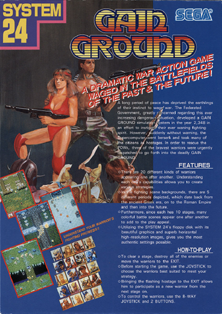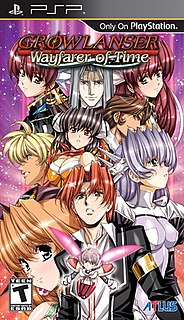
The Nintendo e-Reader, stylized as ereader, commonly abbreviated as e-Reader, known in Japan as the Card-e-Reader, is an add-on manufactured by Nintendo for its Game Boy Advance handheld video game console. It was released in Japan in December 2001, with a North American release following in September 2002. It has an LED scanner that reads "e-Reader cards", paper cards with specially encoded data printed on them.

Replay value is the potential of a video game or other media products for continued play value after its first completion. Factors that can influence perceived replay value include the game's extra characters, secrets and alternate endings. The replay value of a game may also be based entirely on the individual's tastes. A player might enjoy repeating a game because of the music, graphics, gameplay or because of product loyalty. Dynamic environments, challenging AI, a wide variety of ways to accomplish tasks, and a rich array of assets could result in a high replay value.

Mega Man Zero 2 is a video game developed by Inti Creates and published by Capcom for the Game Boy Advance (GBA) handheld game console. It is the second video game in the Mega Man Zero subseries of Mega Man video games.

Resident Evil Outbreak: File #2 is a survival horror video game and is a sequel to Resident Evil Outbreak and final installment of spinoff game series. It was released for the PlayStation 2 in Japan on September 9, 2004, North America on April 26, 2005, and Europe on August 26, 2005.

Gain Ground is a 1988 action-strategy arcade game later ported to home systems.
The Ranger is one of the standard playable character classes in most editions of the Dungeons & Dragons fantasy role-playing game. Rangers are skilled bushcraftsmen/woodcraftsmen, and often lived reclusive lives as hermits.

Bleach: Heat the Soul is a series of 3-D cel-shaded fighting games for the PSP based on the manga and anime series Bleach by Tite Kubo. Each installment was developed by Eighting and published by SCEI. All installments have been released only in Japan.

Power Rangers Dino Thunder is a 2004 action-adventure video game based on the television series of the same name, adapted from Bakuryū Sentai Abaranger. The game was developed by Natsume, Pacific Coast Power & Light and published by THQ for the Game Boy Advance, GameCube, and PlayStation 2.

Stacking is an adventure puzzle video game developed by Double Fine Productions and published by THQ; like Double Fine's previous Costume Quest, it is a smaller title created during the development period of Brütal Legend, and was released in February 2011 for the Xbox 360 and PlayStation 3 video game consoles. A Windows version was released on March 6, 2012. A Linux version was released in May 2013.

Growlanser: Wayfarer of Time is a tactical role-playing game developed by Career Soft and published by Atlus. It was originally released for the PlayStation 2 in Japan in December 2003, and later for the PlayStation Portable in Japan in August 2011 and in North America in July 2012. It is the fourth installment in the Growlanser series, with character designs by Satoshi Urushihara. A visual novel fan-disc Growlanser IV: Wayfarer of Time - Return, containing three short stories, was released on PS2 in 2005.
This list includes terms used in video games and the video game industry, as well as slang used by players.

The Lost Vikings is a puzzle-platform game developed by Silicon & Synapse and published by Interplay. It was originally released for the Super NES in 1993, then subsequently released for the Amiga, Amiga CD32, MS-DOS, and Mega Drive/Genesis systems; the Mega Drive/Genesis version contains five stages not present in any other version of the game, and can also be played by three players simultaneously. Blizzard re-released the game for the Game Boy Advance in 2003. In 2014, the game was added to Battle.net as a free download emulated through DOSBox. In celebration of the company's 30th anniversary, The Lost Vikings was re-released for Microsoft Windows, Nintendo Switch, PlayStation 4 and Xbox One as part of the Blizzard Arcade Collection in February 2021.

Marvel Puzzle Quest is a video game released by D3 Publisher and Marvel Entertainment on October 3, 2013, and developed by Demiurge Studios. The fourth installment in the Puzzle Quest series, it is a free-to-play, match-three Bejeweled-style puzzle battle game set in the Marvel universe, featuring 277 playable, unlockable, recruitable Marvel characters.

Tembo the Badass Elephant is a side-scrolling platform video game developed by Game Freak and published by Sega. The title was released for Microsoft Windows, PlayStation 4, and Xbox One on July 21, 2015. The game allows players to play as an elephant called Tembo, who has different abilities to smash through structures and objects, and is on a journey to rescue the metropolis known as the "Shell City" from an invading evil army known as "Phantom".

Pokémon Picross is a freemium puzzle video game featuring Pokémon characters developed by Jupiter Corporation and published by Nintendo and The Pokémon Company for the Nintendo 3DS. The title is part of the "Picross" nonogram series that use number-based grid puzzles to reveal pictures. It was released as a downloadable title on the Nintendo 3DS eShop worldwide in December 2015.

Mini Mario & Friends: Amiibo Challenge is a puzzle video game developed and published by Nintendo for the Wii U and Nintendo 3DS. The game was free to download on the Nintendo eShop, but requires Nintendo's Amiibo lineup in order to play. It was released in Japan in January 2016 and worldwide in April 2016.

Croc is a 2000 platform game developed by British studio Virtucraft and published by THQ under license from Fox Interactive and Argonaut Games for the Game Boy Color. It is a remake of the 3D platform game, Croc: Legend of the Gobbos, and features similar gameplay taking place in a 2D environment. The game follows the eponymous character, a crocodile named Croc, as he sets out on a quest to save a race of furry creatures called Gobbos from the evil Baron Dante. The game was released on 6 June 2000 to mixed reviews from critics.

Puzzle Fighter was a free-to-play competitive puzzle video game for Android and iOS devices, which is developed by Capcom Vancouver and published by Capcom. It is the successor to 1996's Super Puzzle Fighter II Turbo, and features playable characters from various Capcom franchises. The game launched in November 2017 and was discontinued in July 2018.

Tanglewood is a puzzle platformer developed and published by Big Evil Corporation for the Sega Genesis/Mega Drive. It was crowdfunded through Kickstarter and released on 14 August 2018, with emulated versions available for Windows, Mac, and Linux on Steam and a dual-game cartridge for the Evercade along with Xeno Crisis.


















